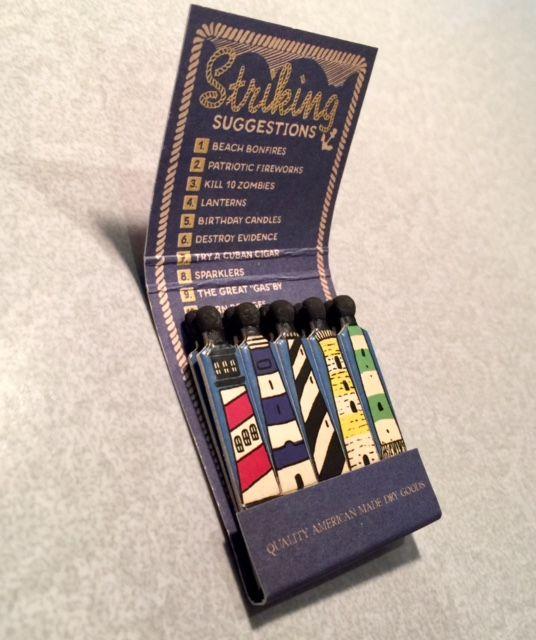Eco-Friendly Options for Custom Matchbooks

Custom matchbooks have long been a popular promotional item for businesses, special events, and even as a keepsake for weddings. With growing awareness about environmental concerns, there has been a shift towards making these items more sustainable and eco-friendly. While matchbooks can be a small item, they have a significant impact on the environment due to the materials and production methods used. In this article, we will explore various eco-friendly options available for custom matchbooks that can help reduce the carbon footprint and make these items more sustainable for businesses and consumers alike.
Sustainable Materials for Custom Matchbooks
The material used to make custom matchbooks plays a key role in determining how environmentally friendly the product will be. Traditional matchbooks are often made from paper and cardboard that are not sourced sustainably, and the chemical processes involved in manufacturing them can be harmful to the environment. To make custom matchbooks more eco-friendly, opting for sustainable materials such as recycled paper, cardboard, and even bamboo can significantly reduce the environmental impact.
Recycled paper is an excellent option for creating custom matchbooks. Using paper that has already been used once helps reduce the need for virgin paper, which in turn saves trees and reduces energy consumption. By choosing post-consumer recycled paper, businesses can ensure that their matchbooks are part of a circular economy, where the materials are reused rather than discarded. This type of paper also reduces the demand for new raw materials, minimizing the environmental footprint.
Bamboo is another eco-friendly material gaining popularity in the production of custom matchbooks. Bamboo is a highly renewable resource that grows quickly and doesn’t require pesticides or fertilizers. Additionally, bamboo is biodegradable, meaning it will break down naturally over time without contributing to pollution. Bamboo-based custom matchbooks are not only more sustainable, but they also give a unique, stylish look that is attractive to consumers who value eco-conscious products.
Eco-Friendly Ink and Printing Methods
When designing custom matchbooks, the type of ink used for printing can significantly affect the product’s environmental impact. Traditional inks often contain harmful chemicals such as volatile organic compounds (VOCs), which can contribute to air pollution and be harmful to both human health and the environment. To make custom matchbooks more eco-friendly, it’s important to use non-toxic, vegetable-based inks that are free from these harmful substances.
Vegetable-based inks are made from renewable resources, such as soybeans, rather than petroleum-based oils. They are biodegradable and produce fewer harmful emissions during the printing process. These inks also tend to produce sharper, more vibrant colors, making them a popular choice for custom designs. In addition to being safer for the environment, they help create a more vibrant and aesthetically pleasing product.
Another consideration for businesses seeking to reduce their carbon footprint is the printing method. Digital printing is often a more eco-friendly option compared to traditional offset printing. Digital printing uses less energy and produces fewer waste materials. Offset printing, while still commonly used, requires large amounts of ink, water, and energy, contributing to a higher environmental impact. By choosing digital printing for custom matchbooks, businesses can reduce their waste and energy consumption, making the production process more sustainable.
Biodegradable and Compostable Matchbook Features
One of the most significant environmental concerns related to custom matchbooks is the disposal of these items after use. Many matchbooks are discarded as waste, contributing to pollution and filling up landfills. To make custom matchbooks more eco-friendly, manufacturers have started to explore the use of biodegradable and compostable materials for various components, such as the match tips and striker pads.
Instead of using synthetic chemicals and materials that take years to decompose, eco-friendly matchbooks are designed with biodegradable match tips and striker pads made from natural ingredients. These components break down more quickly in the environment and do not contribute to long-term pollution. For example, match tips made from wood or other natural materials, rather than plastic or toxic chemicals, are a better alternative for eco-conscious consumers.
Furthermore, the outer casing of the matchbook can also be made from compostable materials that break down when exposed to the elements. Compostable materials can be returned to the earth, where they provide nutrients to the soil rather than contributing to landfill waste. This is an ideal solution for businesses looking to create a truly sustainable product that leaves no lasting impact on the environment.
Reducing Packaging Waste for Custom Matchbooks
Another important aspect of making custom matchbooks eco-friendly is reducing the packaging waste that often accompanies them. Many custom matchbooks come in plastic wrappers or excessive cardboard packaging, which adds to the environmental burden. By using minimalistic packaging or eliminating unnecessary packaging altogether, businesses can reduce the waste associated with these products.
One way to reduce packaging waste is by opting for paper sleeves or wrappers made from recycled or biodegradable materials. These materials can easily be composted or recycled after use, ensuring that the matchbooks do not contribute to landfill waste. Additionally, businesses can consider offering custom matchbooks in bulk or without individual packaging, allowing customers to carry only the necessary number of matchbooks and avoid excess waste.
Another option is to eliminate plastic and other non-biodegradable materials in packaging altogether. By choosing eco-friendly options such as cardboard boxes or paper envelopes, businesses can significantly reduce the amount of plastic waste associated with custom matchbooks. This not only aligns with sustainability goals but also appeals to consumers who are becoming increasingly conscious of their environmental impact.
Energy-Efficient Manufacturing Processes
Manufacturing processes play a key role in determining the sustainability of custom matchbooks. Traditional manufacturing methods often involve high energy consumption and emissions, which contribute to climate change. To make custom matchbooks more eco-friendly, businesses should seek manufacturers that prioritize energy-efficient processes and use renewable energy sources in production.
Manufacturers that utilize solar, wind, or other renewable energy sources in their production facilities reduce their reliance on fossil fuels and minimize their carbon footprint. In addition, energy-efficient machinery and production methods can help reduce the overall energy consumption during the manufacturing process. This means that fewer natural resources are depleted, and less pollution is produced, making the final product more sustainable.
Additionally, businesses can partner with manufacturers that have a clear commitment to sustainability and environmental stewardship. These manufacturers typically employ best practices to reduce waste, conserve energy, and lower emissions. By choosing these types of manufacturers, businesses can ensure that their custom matchbooks are produced in an environmentally responsible manner.
Sourcing from Local Suppliers
Sourcing materials and production from local suppliers is an important aspect of creating eco-friendly custom matchbooks. By supporting local businesses and sourcing materials closer to home, companies can reduce the carbon emissions associated with transportation and shipping. Shipping products long distances requires large amounts of fuel, contributing to greenhouse gas emissions and climate change.
In contrast, sourcing materials locally reduces the need for extensive shipping and transportation, which in turn reduces the carbon footprint. Local suppliers often have a better understanding of the environmental challenges in their region and are more likely to adopt sustainable practices to address these challenges. This makes it easier for businesses to find eco-friendly options for custom matchbooks that are both high-quality and sustainably produced.
Working with local suppliers also has the added benefit of supporting the local economy, which is an important consideration for businesses that want to make a positive impact beyond just environmental concerns.
Eco-Conscious Consumer Education
While adopting eco-friendly practices in the production of custom matchbooks is essential, educating consumers about the benefits of these sustainable options is equally important. Businesses can help promote the adoption of more environmentally friendly products by educating their customers about the materials and processes used in their custom matchbooks.
Informing consumers about the importance of choosing eco-friendly matchbooks can increase demand for these products and encourage businesses to invest in more sustainable production methods. Companies can include information about the eco-friendly materials, production processes, and disposal options on their packaging, websites, or social media platforms. This transparency helps customers make informed decisions and fosters a sense of responsibility toward the environment.
Supporting Sustainability Certifications
For businesses looking to go the extra mile in their commitment to sustainability, supporting sustainability certifications can be an effective way to demonstrate their dedication to environmentally responsible practices. Several certifications, such as the Forest Stewardship Council (FSC) or the Global Recycled Standard (GRS), are available to companies that meet specific sustainability criteria in their products and production processes.
By choosing suppliers and manufacturers that have obtained these certifications, businesses can ensure that their custom matchbooks meet rigorous environmental standards. These certifications also provide customers with confidence that they are purchasing products that have been produced with a commitment to sustainability.
Conclusion
As consumer preferences shift toward more sustainable products, businesses have a unique opportunity to offer eco-friendly custom matchbooks that align with these values. By choosing sustainable materials, reducing packaging waste, and supporting energy-efficient manufacturing, businesses can significantly reduce the environmental impact of their custom matchbooks. Additionally, educating consumers about these sustainable options and supporting sustainability certifications can further promote the adoption of eco-friendly products in the marketplace. Through these efforts, businesses can create products that are not only attractive and functional but also contribute to a more sustainable future.
Visit Our Website: https://ibexpackaging.com/custom-matches/





